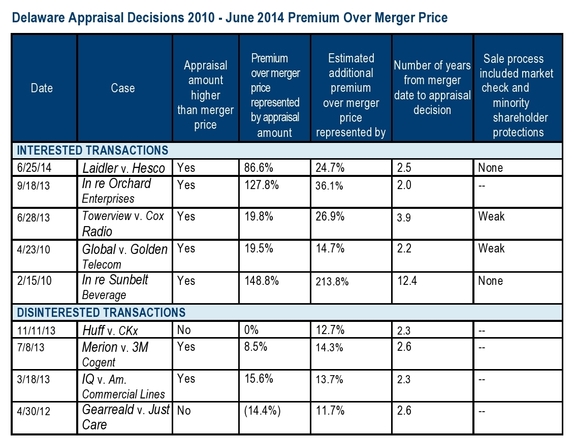|
Law360, New York (August 07, 2014,
10:36 AM ET)
--
Delaware appraisal actions are on
the rise, primarily due to the new
and expanding phenomenon of
“appraisal arbitrage” — in which
shareholder activists and hedge
funds acquire target shares after a
merger is announced and focus on
asserting appraisal claims as a kind
of investment in and of themselves.
From 2004 through 2010, the number
of appraisal petitions filed in
Delaware rose and fell roughly in
parallel with the overall level of
merger activity, with appraisal
rights being asserted in about 5
percent of the transactions for
which they were available. In 2011,
however, the rate of petitions more
than doubled (to 10 percent) and it
has continued to increase. In 2013,
28 appraisal petitions were filed in
Delaware, representing about 17
percent of appraisal-eligible
transactions.
In 2014, so far, more than 20
appraisal claims already have been
filed in Delaware. The amounts at
stake in appraisal actions have
increased as well, with the value of
dissenting shares in 2013 ($1.5
billion) being 10 times the value of
dissenting shares in 2004, and more
than five times the value of
dissenting shares over their highest
point in the last five years. Of the
eight appraisal proceedings between
2004 and 2013 that involved more
than $100 million worth of
dissenting shares, four of them
occurred in 2013. (This data is
derived from a report by law
professors Charles R. Korsmo and
Minor Myers.)
In our review of Delaware post-trial
appraisal decisions from 2010 to
June 2014 (see chart below), we
found that the court’s determination
of fair value was higher than the
merger price in seven of the nine
cases. The highest premium
represented by the appraisal award
over the merger price was 148.8
percent — without even considering
the award of statutory interest
(which, in that case, represented an
additional premium of 213.8 percent
above the merger price). There was
only one case in which the appraisal
award was lower than the merger
price (representing a 14.4 percent
discount to the merger price); and
only one case in which the appraisal
award was the same as the merger
price.
In the five cases that the court
viewed as “interested transactions”
(i.e., controlling stockholder or
parent-subsidiary mergers), the
appraisal award was significantly
above the merger price — with
premiums of 19.5 percent, 19.8
percent, 86.6 percent, 127.8 percent
and 148.8 percent, respectively.
Taking into account the statutory
interest awards in these cases,
there was an additional premium of
approximately 14.7 percent, 26.9
percent, 24.7 percent, 36.1 percent
and 213.8 percent, respectively.
While the extent of the market
checks and protections afforded to
the disinterested shareholders in
these transactions varied, the range
was from none to relatively weak.
Notably, the two highest fair-value
premiums (148.8 percent and 86.6
percent — we have excluded the 127.8
percent premium because it was based
almost entirely on an issue relating
to interpretation of preferred stock
terms and so is not relevant in this
context) were awarded in the only
two cases in which there were no
market checks or minority
protections whatsoever.
For example, the backdrop to the
case with the highest premium was an
arbitration panel determination that
the only reason for the merger was
to eliminate the petitioner as the
sole remaining minority shareholder
— “without notice and without legal
justification ... [and through the
controlling stockholder’s use of]
strong-arm tactics.”
By contrast, in the four
transactions viewed by the court as
“disinterested” (i.e., third party
arm’s-length transactions), the fair
value determination was higher than
the merger price in only two of
them. Further, these premiums, 8.5
percent and 15.6 percent, were
considerably lower than the premiums
in the interested transactions.
 |
Critically, notwithstanding the
notable increase in appraisal
activity, it is still only a fairly
low percentage of all appraisal
eligible transactions (17 percent in
2013) that currently attract
appraisal petitions. (By contrast,
almost all strategic transactions
now attract litigation with breach
of fiduciary duty claims.) Moreover,
while the only consideration in an
appraisal proceeding is the
determination of fair value (and
wrongdoing by the target board or
flaws in the sale process are
legally irrelevant for these
purposes), the transactions that
attract appraisal petitions
generally involve some basis for a
belief that the deal price
significantly undervalues the
company — that is, controlling
stockholder transactions, management
buyouts, or other transactions for
which there did not appear to be a
meaningful market check or
significant minority shareholder
protections as part of the sale
process.
This
Quarter’s Delaware Appraisal Cases
Court Declines to Use
Merger Price as a Basis for
Determining Fair Value:
Laidler v. Hesco (May
12; June 25)
Vice Chancellor Sam Glasscock
declined to use the merger price as
a basis for determining “fair value”
in an appraisal proceeding.
Glasscock had recently decided, in
Huff v. CKx (November 2013), in a
departure from recent Delaware court
practice, to use the merger price as
the basis for determining appraised
fair value. In Hesco, Glassock
distinguished CKx, emphasizing that
the CKx transaction had been fully
arm’s length, there was a
competitive auction, and the court
had determined that no other
financial analysis to determine fair
value was available because of the
high degree of unreliability of
management’s projections.
The merger in Hesco, however — where
the 90 percent parent “itself
decided the price” to pay to the
sole remaining minority shareholder
of its subsidiary in a short-form
merger — was “nothing like” the
arm’s-length competitive auction
process pursuant to which the merger
price was determined (and then
approved by a minority shareholder
vote) in CKx.
With the facts of the CKx
transaction at one extreme with
respect to process protections and
those of Hesco at the other extreme,
it remains unclear whether, and to
what extent, the court will be
inclined to use a merger price as
the basis for appraised fair value
in the context of an arm’s-length
transaction where other financial
analyses are available (or, where
they are not available and there has
been a market check but the market
check was less than perfect).
Also of interest, in Hesco, the
court adopted, for the first time, a
direct capitalization of cash flow (DCCF)
methodology for determining fair
value (rather than the discounted
cash flow (DCF) method usually used
by the court). Both parties’ experts
had agreed that DCCF was the most
appropriate methodology in this case
because of management never having
made cash flow projections in the
ordinary course of its business,
together with the uncertain nature
of the company’s future revenue (due
to its standing to lose the patent
on its primary product and the
unusual nature of its business in
which its primary product is
purchased only in anticipation of or
after major natural disasters).
DCCF differs from DCF in that DCF
projects cash flows over a horizon
period and estimates a terminal
value at which cash flows can be
valued in perpetuity, and then
discounts to present value those
cash flows over multiple periods,
while DCCF estimates a normalized
level of cash flows in perpetuity
and divides those cash flows by a
capitalization rate to estimate the
present value of the business. In
Hesco, the merger price offered to
the dissenting shareholder had been
$207 per share; petitioner’s and
respondent’s experts, both using the
DCCF methodology, had determined
fair values of $515 and $250,
respectively; and the court
determined fair value to be $387.
Voting Issues Cloud
Appraisal Rights:
Merion Capital/Ancestry.com
and Merion Capital/Dole
Food (Both Proceedings are
Pending)
Merion Capital, a hedge fund that
focuses on appraisal arbitrage, is
seeking appraisal of the
Ancestry.com shares it purchased
after Ancestry.com was acquired by
an investor group led by private
equity firm Permira, and the Dole
Food shares it acquired just before
the Dole management buyout. An issue
in both proceedings is that it is
only shares that do not vote for a
merger that are entitled to
appraisal.
It can be difficult to establish how
shares have been voted in two
situations: first, if the shares are
held in street name, in which case
they are voted in the aggregate by
the depositary (albeit in accordance
with instructions from the
beneficial owners), and second, if
the shares are acquired after the
record date for the merger and so
were voted by the previous owner.
The Delaware Supreme Court, in its
2007 Transkaryotic decision,
established that, as shares held in
street name are voted in the
aggregate without attribution to the
beneficial owners, street shares
would be entitled to appraisal
rights so long as the total number
of street shares seeking appraisal
did not exceed the total number of
shares that the depositary voted
against the merger.
In Ancestry, Merion acquired the
shares after the record date for the
merger and did not know how they had
been voted. As the shares are held
in street name, Merion has assumed
that Transkaryotic would apply.
Ancestry has argued, however, in a
brief filed in May, that, since the
law changed after Transkaryotic to
permit beneficial holders (and not
just record holders) to assert
appraisal rights, the beneficial
owner (and not only the record
holder) now has the statutory
obligation to show how its shares
were voted.
The issue that has arisen in the
Dole proceeding is that more shares
are seeking appraisal than have
voted against the merger.
It is not known how the court will
view these issues. Their resolution
may significantly affect
shareholders’ ability to seek
appraisal — especially activist
shareholders and hedge funds that
engage in appraisal arbitrage (and
so often buy shares after the record
date).
—By Abigail Pickering Bomba, Steven
Epstein, Arthur Fleischer Jr., Peter
S. Golden, David Hennes, Renard
Miller, Philip Richter, Robert C.
Schwenkel, David N. Shine, Peter
Simmons, John E. Sorkin and Gail
Weinstein,
Fried Frank Harris Shriver &
Jacobson LLP
Abigail Pickering Bomba,
Steven Epstein,
Peter Golden,
David Hennes,
Philip Richter,
Robert Schwenkel,
David Shine,
Peter Simmons and
John Sorkin are partners in
Fried Frank's New York office.
Arthur Fleischer and
Gail Weinstein are senior
counsel in New York.
Renard Miller is an associate in
the firm's Washington, D.C., office.
The opinions expressed are those of
the author(s) and do not necessarily
reflect the views of the firm, its
clients, or Portfolio Media Inc., or
any of its or their respective
affiliates. This article is for
general information purposes and is
not intended to be and should not be
taken as legal advice.

